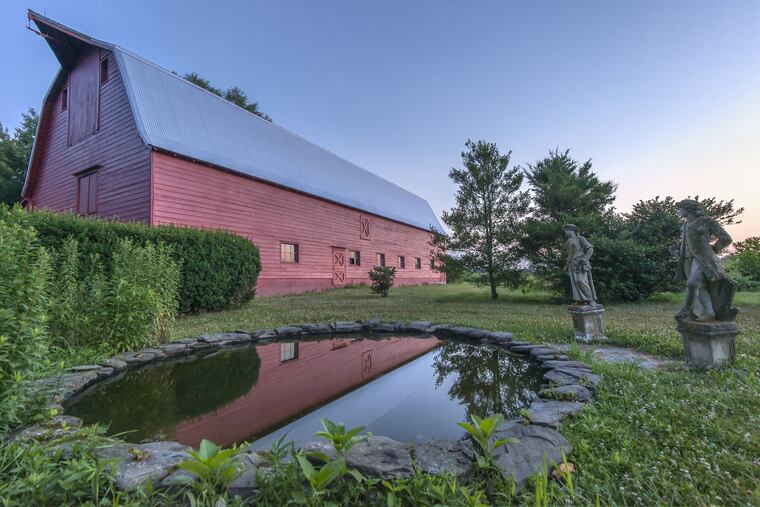These Philly-area environmental groups received millions in coronavirus PPP loans to keep staff afloat
Environmental, conservation, and land trust organizations say they needed the money because they rely on a mix of revenue all impacted by the coronavirus shutdowns.

In 2015, the Pinelands Preservation Alliance, which works to preserve the Pine Barrens ecosystem and promote awareness, started offering paddling trips, guided hikes, and nature tours. The nonprofit also rents out its big red barn for catered events such as weddings. Both have become major revenue generators.
In 2019, the nonprofit’s ecotourism arm, Pinelands Adventures, took 13,000 people on trips and had three full-time employees.
Then came COVID-19: The trips and events were postponed or canceled.
Reluctant to let employees go, the group’s executive director, Carlton Montgomery, applied for a $201,800 loan through the Paycheck Protection Program, a federal stimulus loan designed to keep businesses from laying off workers because of the pandemic. The loans were extended to nonprofits.
“At the time we applied for the loan, we didn’t know all the impacts from the [pandemic]. But we knew our earned income would really take a hit. This absolutely helped with cash flow” and prevented layoffs, Montgomery said.
Data released by the Small Business Administration show that at least 20 environmental or conservation groups in Pennsylvania and New Jersey applied for millions in PPP loans of $150,000 or more. Others might have received loans, but the data don’t disclose names for loans less than that amount. The loans are designed to be forgiven if they are used for payroll, mortgages, rent, or utilities.
Environmental, conservation, and land trust organizations say they needed the money because they rely on a mix of revenue all affected by the coronavirus shutdowns: memberships, fund-raisers, foundational grants, event sales, and public money. They say revenue sources are expected to remain shaky or up in the air at least through the end of the year.
Some of the groups operating in the Philly region that accepted PPP loans include Natural Lands, New Jersey Conservation Foundation, Wetlands Institute, Stroud Water Research Center, Clean Air Council, Delaware Riverkeeper Network, Willistown Conservation Trust, and Wissahickon Valley Watershed Association.
The Pinelands Preservation Alliance restarted kayaking trips in June on a smaller scale. Ten weddings scheduled at the barn were canceled. But luckily, Montgomery said, donations never fell as much as anticipated.
“Revenue is still going to be down significantly for the whole year,” he said. “But, overall, people have really stuck with us, which has been really gratifying.”
Oliver Bass, president of Natural Lands, which has 43 preserves totaling 23,000 acres spread across eastern Pennsylvania and South Jersey, said his organization saw a huge demand for use of outdoor spaces after the pandemic hit. However, that jump came as the outlook for funding became trickier because so many local and state grant sources were hurting from COVID-19 shutdowns.
“We’ve seen three and four times the usual numbers of visitations,” Bass said. “We’ve had the good fortune to be able to continue our work with the staff.”
Natural Lands oversees ChesLen in Chester County, Glades Wildlife Refuge off the Delaware Bay in New Jersey, and Stoneleigh in Villanova, among others. In addition, the nonprofit assembles conservation easements to preserve farmland and other open space, before turning it over to others to preserve.
It received a $1.2 million PPP loan that prevented layoffs, Bass said.
“There has been some costs associated with all of the visitations,” Bass said, noting that staff has had to spend time managing parking, and overused trails.
Michele Byers, executive director of New Jersey Conservation Foundation, said that in March the organization revised projected revenue down 40%, though it won’t know until the end of the year how it really fared.
The foundation manages 17 preserves including, the 9,400-acre Franklin Parker Preserve in Chatsworth, Burlington County, and 25-acre Gateway Park in Camden along the Cooper River, all open to the public for hiking, bird watching, bicycling, or picnicking.
Most of its revenue comes from donations of $35, $100, $500 and up. The group scrapped a live 60th anniversary fund-raiser, and hosted a virtual event that the group said was successful, but raised half as much as it might have in person.
Staff were told to expect either layoffs or salary decreases of as much as 20%, but the PPP loan of about $550,000 prevented both.
“We’re just so fortunate that that program existed,” Byers said. “PPP was just a godsend. We’ve been able to forestall cuts until the fourth quarter. But staff are still on notice that if we don’t experience strong revenue, the salary cuts are still a possibility.”